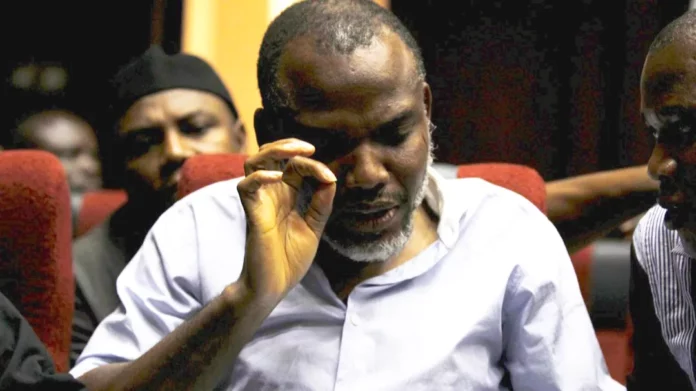Ahead of the scheduled judgment in the Federal High Court, Abuja, Indigenous People of Biafra (IPOB) leader, Mazi Nnamdi Kanu, has filed a criminal complaint accusing the Attorney-General of the Federation (AGF), the Director-General of the Department of State Services (DSS), and two prosecution witnesses of committing perjury in his terrorism trial.
The complaint, filed on November 13, 2025, at a Chief Magistrate Court in the Federal Capital Territory, Abuja, marks a historic move in Nigeria’s legal system. It is reportedly the first time a defendant in DSS custody has initiated criminal proceedings against top government officials and witnesses from detention.
Kanu, who is being tried for alleged terrorism-related offenses in Federal Republic of Nigeria v. Nnamdi Kanu (FHC/ABJ/CR/383/2015), personally signed the complaint, which also names the two prosecution witnesses as Mr. TAA (Witness 1) and Mr. BBB (Witness 2).
In the complaint, Kanu accuses the AGF, DSS DG, and the two witnesses of criminal perjury, fabrication of evidence, subornation of perjury, and conspiracy to pervert the course of justice.
According to a statement issued by his legal team, the Mazi Nnamdi Kanu Global Defence Consortium, PW1 (Mr. TAA) allegedly lied under oath by denying knowledge of DSS official Brown Ekwoaba, who supervised Kanu’s detention, interrogation, and alleged torture in 2015. PW2 (Mr. BBB) reportedly claimed under oath that he had never met Kanu prior to the court proceedings, despite having led Kanu’s interrogation on July 17, 2021.
The complaint contends that the witnesses were deliberately masked and coached to conceal their involvement in past interrogations and to suppress material evidence, including documents relating to Kanu’s solitary confinement, denial of legal counsel, and deteriorating health during detention.
Kanu’s legal team attached multiple exhibits to support the complaint. These include affidavits confirming visits to Ekwoaba’s office, interviews conducted by DSS officials, and public service records showing Ekwoaba’s postings from 2015 to 2020. The consortium claims these documents expose the contradictions in the witnesses’ testimonies.
The complaint further alleges that the AGF and DSS DG conspired to pervert the course of justice by presenting surprise witnesses not listed in the original proof of evidence, relying on statements obtained under duress, and resisting disclosure of those responsible for Kanu’s interrogations. According to the filing, this conduct facilitated the submission of false testimony under oath, undermining the fairness of the trial.
Sections 156, 158, 159, and 160 of the Penal Code, as cited in the complaint, outline the penalties for perjury and related offenses. Kanu’s team argues that the actions of the AGF, DSS DG, and the two witnesses violated these provisions, as well as sections 34 and 36 of the 1999 Constitution (as amended), which guarantee the right to a fair trial, protection from torture, and the right to examine accusers.
Kanu is seeking judicial acknowledgment that the prosecution’s case was built on fabricated, coerced, and perjured evidence, and is requesting criminal committal proceedings against all four accused parties.
The Abuja Federal High Court is scheduled to deliver judgment in Kanu’s trial on November 20, 2025. Observers say the criminal complaint may influence the court’s proceedings, particularly as it raises questions about the integrity of evidence presented by the prosecution.
The DSS has not publicly responded to the complaint. Similarly, the AGF’s office has yet to issue a statement regarding the allegations of perjury and conspiracy to pervert justice.
Kanu, who founded IPOB, has faced multiple charges related to terrorism, treasonable felony, and other offenses since 2015. He has been in and out of detention, and his trial has been closely followed both nationally and internationally due to its political and security implications.
Supporters of IPOB argue that Kanu has been subjected to harsh treatment while in detention, including alleged solitary confinement and denial of legal rights. Critics maintain that the state has acted within its legal remit to prosecute terrorism-related offenses.
The new criminal complaint adds a complex dimension to an already high-profile trial. By formally accusing top government officials of perjury and conspiracy, Kanu is challenging not only individual witnesses but also institutional processes within Nigeria’s justice system.
The filing has sparked discussions on social media and among legal practitioners. Some see it as a bold assertion of the right to challenge state actors, while others caution that the complaint will face a high evidentiary threshold given the prominence of the accused parties.

